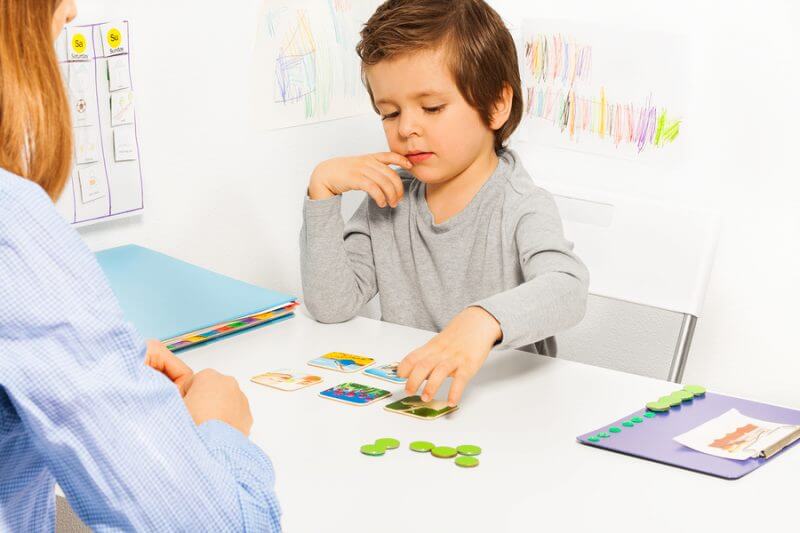
How do you know what therapy is right for your autistic child?
If you have a child who is newly diagnosed with autism, or are thinking of starting a new therapy program for an autistic child, I highly recommend reading the article Which Therapies Can Help with Autism.
The learning curve for therapies to help your autistic child can be daunting. Not every therapy works for every child, and it can take time to find the right fit for you and your family.
Parents often feel pressured into certain kinds of therapies by well-meaning friends and family or by what is being featured in the media. Des Rocs says,
“Autistic kids can benefit from specific supports, but we need to be cautious and mindful of our kids’ personalities, interests, tolerances, and needs when settling on those supports. We need to be especially careful about not putting our kids in therapies just because they are touted as ‘gold standards for all autistic kids.’”
Shannon recommends getting a communication evaluation done and reading guidelines such as Sparrow Jones’ article What Does Helpful versus Harmful Therapy Look Like. Once the communication needs are assessed, then it’s time to decide how to best help them learn and interact with the world. Remember that each child’s path will be different so it’s important to take an individualized approach. I can attest to this having two children with autism that both have very different learning styles, needs, and interests.
Four tips to evaluate if your autism therapy is helping your ASD child
1)Enjoyment level. While this can be difficult to quantify, there are certain obvious signs. In my experience, my children did much better learning when their therapy included favourite subjects, objects or activities. While not everything in life can be “fun”, your child doesn’t need to be uncomfortable, stressed out, or scared to learn. Remember: just because a therapy works on TV, is highly recommended, or has worked for other children doesn’t mean it is going to be successful or therapeutic for your child. But don’t lose hope – there are many different therapies out there. You will find something that fits!
2)Are your children actually learning tools? Or are they performing “tricks” to make their therapists or you happy. Again, this can be a subtle difference, but it is key. Is your child making connections for themselves, or are they given a series of “performance for reward” training sessions. Real tools might not show measurable outcomes right away, but over time they will serve your child better.
3)Does the therapy involve a lot of emotional stress and confusion? This is likely not going to produce lasting results – and who really wants their child to be stressed out? Sometimes it’s just not the right method, or even the right chemistry between therapist and child. It doesn’t have to be a “good vs bad” judgment call. It can just be a “this isn’t the right fit, we are going to try something else.”
4)”Listen” to your child and trust your own instincts. Whether they are using words, gestures, tears, laughter, or just body language, your child is going to tell you how they feel about their therapy. There are many choices and resources out there – if your gut is telling you that this therapy doesn’t seem right, trust yourself. Try something else. It took years to find the right mix for my two children on the spectrum, who both needed very different things. It was worth the search. My kids get a lot out of their lives, are learning to work, and finishing school. Getting them to try many different therapies and activities only helped them grow and get more out of life. You can apply the LILA principle to your children’s therapy, as well as to their activities.
Still worried and confused? Read Finding a Program that Works for Your Child with ASD and Choosing a Treatment/Therapy for Individuals with ASD.
-
Autistic Logistics – A Parent’s Guide to Tackling Bedtime, Toilet Training, Tantrums, Hitting, and Other Everyday Challenges – 2nd. Edition
This updated edition is based on Kate Wilde’s decades of experience and the latest autism research. Tackling a wide range of common parenting milestones, the book offers tried-and-tested techniques to help you transform the challenges of home life and create harmony.
$29.95 Product Details »
-
Focusing and Calming Games for Children – Mindfulness Strategies and Activities to Help Children to Relax, Concentrate and Take Control
A book of games and activities to help children to focus, concentrate, and stay calm. The book includes a comprehensive but accessible theory section, and a host of games and activities suitable for use with groups or individual children aged 5–12. Ideas for adaptation for children with attention and concentration difficulties are included.
$45.95 Product Details »
Editorial Policy: Autism Awareness Centre believes that education is the key to success in assisting individuals who have autism and related disorders. Autism Awareness Centre’s mission is to ensure our extensive autism resource selection features the newest titles available in North America. Note that the information contained on this web site should not be used as a substitute for medical care and advice.


